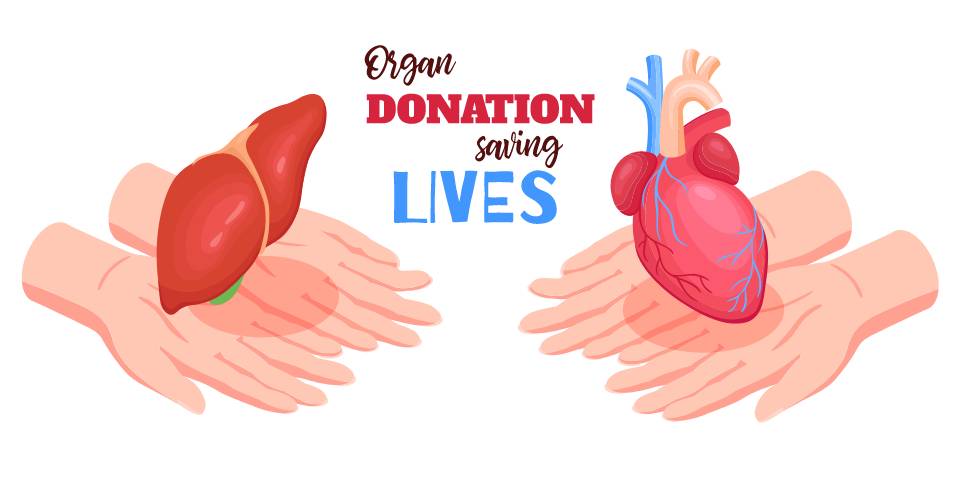Did you know that just one organ donation can save up to eight lives? According to a survey In India every year about: 500,000 people die because of the non-availability of organs, 200,000 people die due to liver disease, and 50,000 people die because of heart disease. Moreover, 150,000 people await a kidney transplant but only 5,000 get among them. Also, annual liver transplant requirement is 25,000, but we manage only about 800. The waitlist for patients is growing all the time. Everyone is a potential organ and tissue donor after death
Many people are confused or have questions about what it means to be an organ donor and sometimes, myths and misperceptions about organ donation can prevent donating it. Here are some myths and facts about organ donation it can be helpful to bust the myths by learning and sharing these facts.
9 Myths and Facts about Organ Donation:
Myth 1: I’m too old to be a donor
Fact: There is no set age limit for organ and tissue donation. What matters is the health and condition of your organs when you die or declare brain dead. Don’t decide for yourself, Let the doctors decide at your time of death whether your organs and tissues are suitable for transplantation.
Myth 2: Organ donation is against my religion
Fact: In India, Most religions encourage organ donation as an act of love and compassion but lots of misconceptions about organ donation, If you have any doubts you can consult your religious leader.
Myth 3: My family will be charged if I donate my organs
Fact: The organ donor’s family is never charged for donating. The family is charged for the cost of all final efforts to save your life, and those costs are sometimes misinterpreted as costs related to organ donation. Costs for organ removal go to the transplant recipient.
Myth 4: I have a medical condition, so I can’t be a donor
Fact: Very few medical conditions disqualify you from donating organs and tissues. While certain organs may not be suitable for transplant, other organs and tissues may be fine.
Myth 5: As a Hindu, if I donate organs, I will be born without them in my next birth.
Fact: When a Hindu is cremated, the entire body is consigned to flames and destroyed by fire. As per scriptures, the only element not destroyed is the soul. The physical body does not survive death anyway, so the organs hold no relevance in rebirth as they are destructible. It is the everlasting soul that is reborn.
Myth 6: If they see I’m a donor at the hospital, they won’t try to save my life
Fact: When you go to the hospital for treatment, doctors focus their priority on saving your life. Organ donation can only be considered after brain death occurs.
Myth 7: People in the LGBT community can’t donate
Fact: No policy excludes a member of the LGBT community from donating organs.
Myth 8: Only hearts, livers, and kidneys can be transplanted
Fact: There is no set age limit for organ and tissue donation. What matters is the health and condition of your organs when you die or declare brain dead. Don’t decide for yourself, Let the doctors decide at your time of death whether your organs and tissues are suitable for transplantation.
Myth 9: Can someone with COVID-19 donate organs and tissues?
Fact: People who have recovered from COVID-19 may be able to donate some organs or tissues, which will be determined on a case-by-case basis.
We don’t know whether there is life after death. But when you donate you can give life to at least eight people. So you can think of this as living even after your death,” the doctor says with a smile. Take a step closer to helping others.
Who can donate organs?
- Every adult can be an organ donor. If parents give consent, even children can be organ donors
- A donor can donate:
– Up to 100 years: Corneas, skin
– Up to 70 years: Kidneys, liver
– Up to 50 years: Heart, lungs
– Up to 40 years: Heart valves - A brain-dead person is medically and legally dead and cannot recover.
We understand it is difficult to think about organ donation when you have just lost a loved one; however organ donation is a generous and worthwhile decision that can save many lives. By donating, each person can save the lives of up to 8 individuals by way of organ donation and enhance the lives of over 50 people by way of tissue donation.
So don’t bury or burn your organs, pass it on, give a gift of life to someone!
You can help bust the myths about organ donation and help save lives by learning and sharing these facts. If you have more questions about organ transplants then you get the expert’s advice in that. Do you want to be an organ donor? Please find below the link for further details on Organ Donation: Click Here

